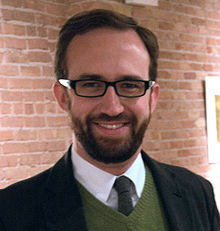Adam Kotsko
21st-century American writer and theologian From Wikipedia, the free encyclopedia
21st-century American writer and theologian From Wikipedia, the free encyclopedia
Adam Kotsko (born 1980) is an American theologian, religious scholar, culture critic, and translator, working in the field of political theology. He served as an Assistant Professor of Humanities at Shimer College in Chicago, which was absorbed into North Central College in 2017. He writes about philosophers Slavoj Žižek and Giorgio Agamben, as well as American pop culture.
An editor has nominated this article for deletion. You are welcome to participate in the deletion discussion, which will decide whether or not to retain it. |
Adam Kotsko | |
|---|---|
 Kotsko in 2011 | |
| Born | July 19, 1980 |
| Academic background | |
| Alma mater | |
| Thesis | Atonement and Ontology (2009) |
| Doctoral advisor | Ted Jennings |
| Influences | |
| Academic work | |
| Discipline | |
| Sub-discipline | Political theology |
| Institutions | |
| Website | adamkotsko |
Adam Kotsko was born on July 19, 1980,[citation needed] in Flint, Michigan, and grew up in nearby Davison.[3][4]
Kotsko earned his Bachelor of Arts degree at Olivet Nazarene University in Bourbonnais, Illinois, in 2002.[3][5] From there, he went on to the Chicago Theological Seminary (CTS), where he completed a Master of Arts degree in religious studies in 2005, with a thesis in the form of a translation and commentary on Jacques Derrida's essay "Literature in Secret: An Impossible Filiation".[6]
Kotsko completed his Doctor of Philosophy degree in theology, ethics, and culture at CTS in 2009.[5] His doctoral dissertation was titled Atonement and Ontology.[7][8] A modified version of his dissertation was published by Continuum International Publishing Group in 2010 under the title of The Politics of Redemption: The Social Logic of Salvation.[9]
After completing his doctorate in 2009, Kotsko taught for two years at Kalamazoo College, a liberal arts college in Michigan.[10][11]

In 2011, Kotsko was hired by Shimer College, a small great-books college in Chicago.[12]
Kotsko is known for his writings on the philosopher Slavoj Žižek, whom he has credited for causing him to "break out of one particular intellectual ghetto and into another" by changing his self-identification from "non-Republican" to leftist.[3] His first book, which was published in 2008 was on Žižek, titled Žižek and Theology (the first volume of T&T Clark's "Philosophy and Theology" series).[13][14] In 2012, Kotsko published a more popular article, "How to Read Žižek" in the Los Angeles Review of Books.[15]
Kotsko has also published three book-length translations of works by Italian philosopher Giorgio Agamben. He has also published and delivered a number of papers on Agamben.[16]
Kotsko has published three short books on popular culture, Awkwardness: An Essay (2010), Why We Love Sociopaths: A Guide to Late Capitalist Television (2012), and Creepiness (2015). Each book draws out a specific theme found in contemporary American television shows; Awkwardness addressing the curious rise of "awkward humor" in the 21st century, Why We Love Sociopaths addressing the trend toward a certain type of deeply antisocial protagonist, and Creepiness uses a Freudian lens to distinguish a discomfiting strain of popular culture from the topic of the first book.
In 2015, Kotsko was the subject of controversy when he tweeted that all white people, regardless of their ancestry or whether their ancestors owned slaves, are "complicit" in slavery.[17] While the tweets were later deleted, Kotsko has said he stands by his statements.[17] Due to this controversy, Kotsko was named in an online "watch list" of college professors who discriminate against conservative students.[18][undue weight? – discuss]
In 2016, Kotsko published a book about the Devil in Christianity, The Prince of This World.[19]
In 2018, Kotsko published a book that examines neoliberalism through the lens of political theology, Neoliberalism's Demons: On the Political Theology of Late Capital.[20]
Kotsko blogs chiefly on a group blog titled An und für sich, but also posts on a personal blog, titled The Weblog.[14]
Seamless Wikipedia browsing. On steroids.
Every time you click a link to Wikipedia, Wiktionary or Wikiquote in your browser's search results, it will show the modern Wikiwand interface.
Wikiwand extension is a five stars, simple, with minimum permission required to keep your browsing private, safe and transparent.